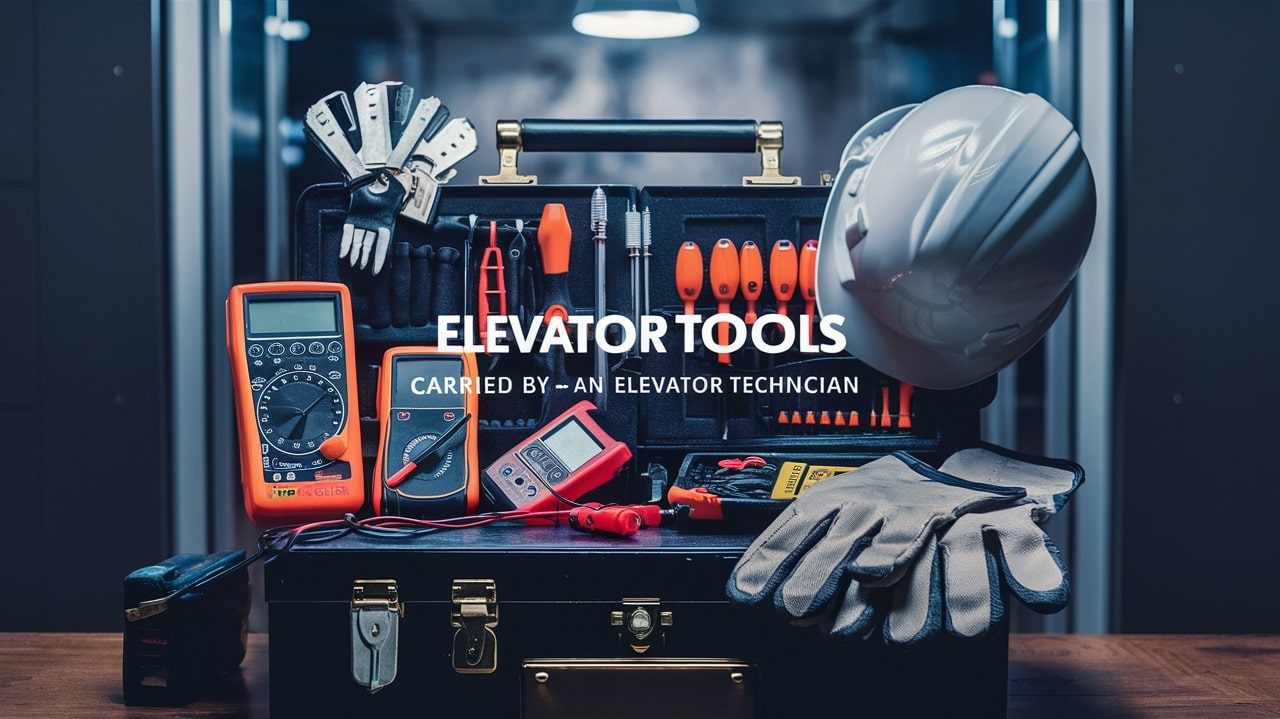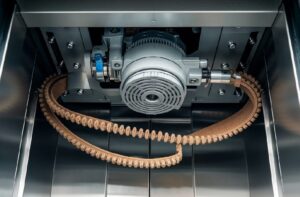Introduction
Elevator technicians play a crucial role in maintaining the safety and functionality of elevators. Whether it’s routine maintenance or an emergency repair, having the right tools is essential. This guide reviews the must-have tools every elevator technician should carry to provide immediate support and uphold high safety standards.
The links and images provided below offer references for each tool. Our technicians mostly use the items on this list, and my personal expertise has allowed me to select the best products. We could receive a little 🤏 affiliate commission if you make a purchase after clicking links on our website.
Must-Have: Essential Tools For Elevator Technicians
1) Hardhat Helmet
A hardhat helmet is vital for protecting the technician’s head from falling objects and other hazards. In the confined spaces of elevator shafts and machine rooms, head protection is a must. Hardhat helmets with adjustable straps and a comfortable fit are recommended for long hours of wear.
These helmets are designed to withstand impact, safeguarding the technician from any potential injuries that might occur due to unexpected accidents. Given the nature of elevator maintenance, where technicians often work in tight and precarious spaces, a hardhat is not just a safety precaution but a necessity. Some advanced hardhat helmets also come with built-in lights, which can be extremely useful in poorly lit areas, allowing technicians to see clearly and work more efficiently.
2) Door Lock Key
If someone asks me which single tool I should keep with me in case of an emergency, my answer would be the elevator door key. With it, you can resolve a stuck elevator issue before doing anything else. Door lock keys are essential for accessing elevator shafts and machine rooms. These keys are designed to open specific elevator doors, allowing technicians to perform maintenance and repairs. Having a reliable door lock key on hand ensures that technicians can access restricted areas quickly and safely.
Different types of elevators and buildings may require specific keys, so it is important for technicians to carry a set of keys that match the elevators they commonly work on. In emergency situations, quick access to the elevator shaft or machine room can make a significant difference, enabling technicians to resolve issues promptly and efficiently. So you can go for below link by clicking on it.
3) Elevator Mechanic Tool Bags
Organized tool bags are crucial for elevator technicians. These bags should be durable, spacious, and equipped with multiple compartments to store various tools. A well-organized tool bag ensures that technicians can quickly find the necessary tools during emergency repairs, reducing downtime.
Elevator mechanic tool bags are specifically designed to hold a wide array of tools, from small screwdrivers, cutting tools, water leveling, measuring instruments, and avometers to the 5PCS COMBINATION SPANNERS SET (8/10/13/17/19mm). The compartments help keep everything in its place, preventing tools from getting lost or damaged. Moreover, having a dedicated tool bag means that technicians can easily carry their tools from one job site to another without the risk of forgetting essential items.
4) Commissioning Tools
Commissioning tools are used during the installation and testing of new elevators. These tools help technicians ensure that the elevator operates correctly and meets all safety standards. Common commissioning tools include multimeters, signal generators, and testing weights.
These tools are critical for verifying that all electrical and mechanical systems are properly installed and calibrated. Multimeters, for instance, are used to measure voltage, current, and resistance, ensuring that the electrical circuits are functioning correctly. Signal generators can test communication systems, while testing weights are used to verify that the elevator can handle its intended load capacity safely. This inspection box is used to control the elevator during maintenance and inspections.
5) Avometer
An AvoMeter (short for Ampere-Volt-Ohm Meter) is a versatile electrical measuring instrument that combines the functions of an ammeter, voltmeter, and ohmmeter in a single device. The user connects the AvoMeter to the circuit or component under test using probes. Depending on the setting (current, voltage, or resistance), the meter displays the corresponding value on its scale or digital display.
An AvoMeter is a fundamental tool for electricians, technicians, engineers, and anyone working with electrical systems. Its ability to measure multiple electrical parameters makes it an essential tool for maintaining and repairing electronic devices and circuits.
You can order the mentioned measurement tools through Amazon, which are used by over thousands of technicians and are also cost-effective.
6) Gloves
Protective gloves are essential for preventing hand injuries. Technicians often handle sharp and heavy objects, making gloves a necessary part of their safety gear. The gloves should have good grip and be rubber-coated so they can be accessible for heavy goods and light goods as well.
Different types of gloves may be required, depending on the task. For instance, cut-resistant gloves are ideal for handling sharp objects, while insulated gloves are necessary when working with electrical components. By wearing the appropriate gloves, technicians can protect their hands from cuts, burns, and other injuries, ensuring they can perform their tasks safely and effectively
7) Goggles for Eye Protection
Eye protection is crucial when working with tools and machinery. Safety goggles prevent debris, dust, and sparks from causing eye injuries. Technicians should choose goggles that fit well and offer clear visibility.
Eye injuries can be serious and debilitating, making eye protection a top priority. Safety goggles should be comfortable and not obstruct the technician’s vision. Some goggles are designed to fit over prescription glasses, ensuring that technicians with corrective lenses can also protect their eyes. By wearing safety goggles, technicians can prevent a range of eye injuries and work with confidence.
8) Safety Shoes
Safety shoes are designed to protect technicians’ feet from injuries. These shoes should have reinforced toes and slip-resistant soles. Comfortable and durable safety shoes are essential for technicians who spend long hours on their feet.
The right safety shoes provide protection from falling objects, electrical hazards, and slips. Reinforced toes protect against heavy objects, while slip-resistant soles provide stability on wet or uneven surfaces. Comfort is also important, as technicians often spend long hours standing or walking. By choosing high-quality safety shoes, technicians can protect their feet and maintain their productivity.
I personally prefer Timberland safety shoes.
9) Fall Protection
Fall protection gear is critical for technicians working at heights. This includes harnesses, lanyards, and anchors. Proper fall protection prevents serious injuries and ensures that technicians can work safely in elevated areas.
Given the heights at which elevator technicians often work, fall protection is non-negotiable. Harnesses and lanyards must be properly fitted and regularly inspected to ensure they are in good condition. Anchors should be securely attached to stable structures, providing a reliable point of attachment. Using fall protection gear not only safeguards the technician but also ensures compliance with safety regulations.
10) Elevator Inspection Check List
An elevator inspection checklist is a comprehensive guide that technicians use to ensure all maintenance tasks are completed. This checklist includes items such as checking the control systems, inspecting the highway, and testing the emergency brakes. Using a checklist ensures that no aspect of the elevator is overlooked.
Regular inspections are crucial for maintaining elevator safety and reliability. An inspection checklist helps technicians stay organized and thorough, ensuring that every component is inspected and any potential issues are identified and addressed promptly. By following a standardized checklist, technicians can provide consistent and high-quality maintenance services.
.
FAQ
Q: Why is it important for elevator technicians to carry these tools? A: These tools are essential for ensuring safety, efficiency, and the ability to provide immediate support during emergencies. They help technicians perform their tasks effectively, reducing the risk of accidents and ensuring that elevators operate smoothly.
Q: Does brand matter for tools used by elevator technicians? A: It’s important to use high-quality, reliable tools to ensure safety and efficiency. Some brands may offer specialized tools designed specifically for elevator maintenance. Technicians should choose tools that meet industry standards and are known for their durability and performance.
Q: How often should elevator technicians update their tools? A: Regularly checking and updating tools is important. Technicians should replace any damaged or worn-out tools to maintain safety and performance. Staying updated with the latest tools and technologies can also enhance the technician’s ability to perform their tasks efficiently and effectively.
Q: What are the consequences of not having the right tools? A: Without the right tools, technicians may not be able to perform repairs or maintenance tasks effectively. This can lead to prolonged downtime, increased safety risks, and potential damage to the elevator system. Having the correct tools ensures that technicians can address issues promptly and maintain high safety standards.
















Hey there, You have done a great job. I’ll certainly digg it and for my part suggest to my friends. I am sure they’ll be benefited from this web site.